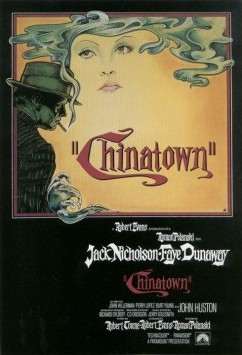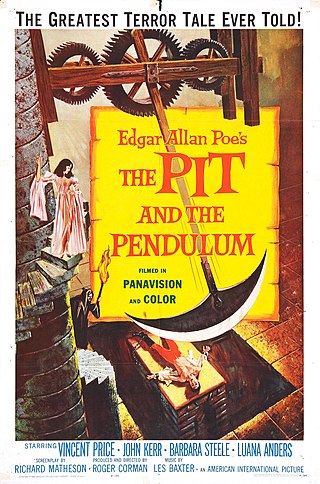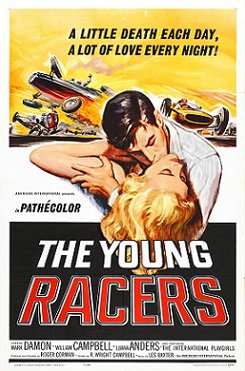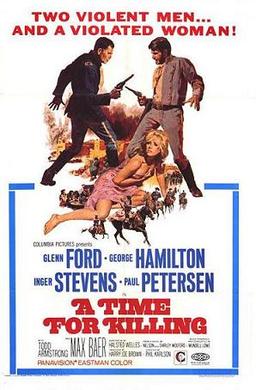
Henry Warren Beatty is an American actor and filmmaker. His career has spanned over six decades, and he has received numerous accolades, including an Academy Award and three Golden Globe Awards. He also received the Irving G. Thalberg Award in 1999, the BAFTA Fellowship in 2002, the Kennedy Center Honors in 2004, the Cecil B. DeMille Award in 2007, and the AFI Life Achievement Award in 2008.

Chinatown is a 1974 American neo-noir mystery film directed by Roman Polanski from a screenplay by Robert Towne. The film stars Jack Nicholson and Faye Dunaway. It was inspired by the California water wars, a series of disputes over southern California water at the beginning of the 20th century, by which Los Angeles interests secured water rights in the Owens Valley. The Robert Evans production, released by Paramount Pictures, was Polanski's last film in the United States and features many elements of film noir, particularly a multi-layered story that is part mystery and part psychological drama.

Roger William Corman is an American film director, producer, and actor. Known under various monikers such as "The Pope of Pop Cinema", "The Spiritual Godfather of the New Hollywood", and "The King of Cult", he is known as a trailblazer in the world of independent film. Many of Corman's films are low-budget cult films including some which are adapted from the tales of Edgar Allan Poe.

The Last Detail is a 1973 American comedy-drama film directed by Hal Ashby, from a screenplay by Robert Towne, based on the 1970 novel of the same name by Darryl Ponicsan. The film stars Jack Nicholson, Otis Young, Randy Quaid, Clifton James, and Carol Kane. It follows two career sailors assigned to escort a young emotionally withdrawn recruit from their Virginia base to Portsmouth Naval Prison in Maine.

Greystoke: The Legend of Tarzan, Lord of the Apes is a 1984 adventure film directed by Hugh Hudson based on Edgar Rice Burroughs' novel Tarzan of the Apes (1912). Christopher Lambert stars as Tarzan and Andie MacDowell as Jane; the cast also includes Ralph Richardson, Ian Holm, James Fox, Cheryl Campbell, and Ian Charleson.

The Two Jakes is a 1990 American neo-noir mystery film and the sequel to the 1974 film Chinatown. Directed by and starring Jack Nicholson, who reprises his role of J.J. “Jake” Gittes from the first film, the cast also features Harvey Keitel, Meg Tilly, Madeleine Stowe, Richard Farnsworth, Frederic Forrest, David Keith, Rubén Blades, Tracey Walter and Eli Wallach. Also reprising their roles from Chinatown are Joe Mantell, Perry Lopez, James Hong, and, in a brief voice-over, Faye Dunaway. The musical score for the film is by Van Dyke Parks, who also appears as a prosecuting attorney.

The Tomb of Ligeia is a 1964 British horror film directed by Roger Corman. Starring Vincent Price and Elizabeth Shepherd, it tells of a man haunted by the spirit of his dead wife and her effect on his second marriage. The screenplay by Robert Towne was based upon the short story "Ligeia" by American author Edgar Allan Poe and was the last in his series of films loosely based on the works of Poe. Tomb of Ligeia was filmed at Castle Acre Priory and other locations with a mostly British cast.
A script doctor is a writer or playwright hired by a film, television, or theatre production company to rewrite an existing script or improve specific aspects of it, including structure, characterization, dialogue, pacing, themes, and other elements.

The Fortune is a 1975 American black comedy film starring Jack Nicholson and Warren Beatty, and directed by Mike Nichols. The screenplay by Adrien Joyce focuses on two bumbling con men who plot to steal the fortune of a wealthy young heiress, played by Stockard Channing in her first film starring role.

The Pit and the Pendulum is a 1961 horror film directed by Roger Corman, starring Vincent Price, Barbara Steele, John Kerr, and Luana Anders. The screenplay by Richard Matheson was loosely inspired by Edgar Allan Poe's 1842 short story of the same name. Set in sixteenth-century Spain, the story is about a young Englishman who visits a forbidding castle to investigate his sister's mysterious death. After a series of horrific revelations, apparently ghostly appearances and violent deaths, the young man becomes strapped to the titular torture device by his lunatic brother-in-law during the film's climactic sequence.

Charles Byron Griffith was an American screenwriter, actor, and film director. He was the son of Donna Dameral, radio star of Myrt and Marge, along with Charles' grandmother, Myrtle Vail, and was best known for writing Roger Corman productions such as A Bucket of Blood (1959), The Little Shop of Horrors (1960), and Death Race 2000 (1975).

Bo Goldman was an American screenwriter and playwright. He received numerous accolades including two Academy Awards, two Golden Globe Awards, two Writers Guild of America Awards as well as the Lifetime Achievement Award in 1998. He also received two BAFTA Award nominations.
Charles Kemper Eastman was an American screenwriter and script doctor. He wrote the screenplay for the 1970 film Little Fauss and Big Halsy; he wrote and directed The All-American Boy. Charles Eastman died from complications of heart disease in Culver City, California on July 3, 2009.

The Young Racers is a 1963 sports drama film directed by Roger Corman and starring Mark Damon, William Campbell, Luana Anders and Patrick Magee. It is based on the Formula One races in Europe.
Robert Wright Campbell, often credited as R. Wright Campbell or Robert Campbell, was an American screenwriter, author and occasional actor. He was the brother of actor William Campbell and brother in law of Judith Campbell Exner. He wrote ten television series, including Maverick and Marcus Welby, M.D..

A Time for Killing is a 1967 Western film directed originally by Roger Corman but finished by Phil Karlson. Filmed in Panavision and Pathécolor, it stars Glenn Ford, George Hamilton, Inger Stevens, and Harrison Ford in his first credited film role.
The 10th National Society of Film Critics Awards, given on 29 December 1975, honored the best filmmaking of 1975.
Gerald Ayres was an American film studio executive, producer and screenwriter. He is known for his work as producer of The Last Detail (1973) starring Jack Nicholson and as writer of Rich and Famous (1981) the last film directed by George Cukor.
The Filmgroup was a production and distribution company founded by filmmakers Roger Corman and Gene Corman in 1959. Corman used it to make and distribute his own movies, as opposed to ones he was making for American International Pictures. The company ultimately folded, however, lessons from running the company helped Corman make a success later of New World Pictures. Filmgroup also produced early feature work of Francis Ford Coppola, Peter Bogdanovich, Charles B. Griffith, Curtis Harrington, Jack Hill, Monte Hellman, Robert Towne and Jack Nicholson.













